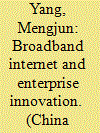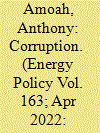|
|
|
Sort Order |
|
|
|
Items / Page
|
|
|
|
|
|
|
| Srl | Item |
| 1 |
ID:
187868


|
|
|
|
|
| Summary/Abstract |
Based on microdata from China's listed companies and macrodata for broadband internet access in prefecture-level cities, this paper explores the relationship between broadband internet and enterprise innovation. Using the change in market concentration caused by the North–South separation reform of China Telecom in 2002 as an instrumental variable, the results show that in general, a 1% increase in broadband internet access results in a 1.395% increase in the number of corporate patents. Specifically, the number of valid patents, patent citations and valid patent citations, reflecting patent quality, increases by 1.499%, 0.920% and 0.763%, respectively. The mechanistic analysis shows that broadband internet access contributes to increasing the number of R&D personnel and personal innovation efficiency, enhancing enterprises' willingness to innovate, and easing financing constraints. Further analysis suggests that broadband internet access mainly promotes invention patents rather than design patents. The innovation effect is more evident among high-tech, inventor-intensive, state-owned enterprises and enterprises located in the non-southeastern coastal region of China.
|
|
|
|
|
|
|
|
|
|
|
|
|
|
|
|
| 2 |
ID:
183620


|
|
|
|
|
| Summary/Abstract |
Increasingly, a significant part of the literature on corruption establishes a negative relationship between corruption and economic variables. However, empirical research showing the influence of corruption on renewable energy consumption is useful because of the global interest in achieving a low-carbon and clean environment. In this light, we model a relationship between corruption and renewable energy consumption (% of total final energy consumption) in Africa. Using a panel dataset for 32 African countries covering the period 1996–2019, we first show that perception about corruption is relatively high in Africa. In line with corruption theory, both Generalized Method of Moments and Instrumental Variable estimation techniques are used to establish that corruption is inimical to the share of renewable energy consumption in total final energy consumption in Africa. To investigate the robustness of the results, we disaggregate the sample into high and low environmental performance countries as well as upper and lower-middle-income countries and still find consistent results. Our results call for strategic policies and institutional structures that seek to prevent corruption from further permeating the continent's administrative structures.
|
|
|
|
|
|
|
|
|
|
|
|
|
|
|
|
| 3 |
ID:
159031


|
|
|
|
|
| Summary/Abstract |
Using micro-data from the Taiwan Population and Housing Census, this study estimates the causal effect of fertility on the labor supply of married women. To address the endogeneity of fertility, we exploit exogenous variations in the number of children caused by twin births, which can be considered a natural experiment. The instrumental variable estimates indicate that an additional child reduces female employment by 10.5 percentage points for those who have at least one delivery, and the effects gradually decline for females who have two or more deliveries, with the effects vanishing when females have three or more deliveries. Also, the effect of fertility varies substantially with the time elapsed since the last childbirth, which has a consequence for differences in estimates across different samples in the literature.
|
|
|
|
|
|
|
|
|
|
|
|
|
|
|
|
| 4 |
ID:
169856


|
|
|
|
|
| Summary/Abstract |
the literature proposes that a booming minerals sector leads to a development curse. The mineral markets in China experienced a prolonged boom over the period of 2000–2010. We empirically examine the effects of mineral resources on employment in county economies during the boom. We consider the endogeneity of the resource measure and employ an instrumental variables approach to resolve the problem. We find the mining boom exerts a significant “crowding out” effect on the manufacturing employment in mineral-resource-dependent counties, but benefits the employment in services. Because the increase in mining employment is sizeable in a mining boom, the overall employment in the resource-dependent counties has shown a small growth. These results are robust to alternative samples. Our findings confirm the argument that resource booms undermine manufacturing sectors through deindustrialization effects, though little evidence shows the existence of a resource curse in overall employment. We conclude that for a developing economy with rich mineral resources and a large population, it would be hard to following the road of industrialization relying on manufacturing.
|
|
|
|
|
|
|
|
|
|
|
|
|
|
|
|
| 5 |
ID:
167859


|
|
|
|
|
| Summary/Abstract |
While not always a concern for the general economic growth literature, the debate over the effects of military spending on growth continues to develop, with no consensus, but a deepening understanding of the limitations of previous work. One important issue that has not been adequately dealt with is the endogeneity of military spending in the growth equation, mainly because of the difficulty of finding any variables that would make adequate instruments. This paper considers this issue, using an endogenous growth model estimated on a large sample of 109 non-high-income countries for the period 1998–2012. The empirical analysis is framed within an instrumental variable setting that exploits the increase in military spending that occurs when unrest in a country escalates to turmoil. The estimation results show that endogeneity arising from reverse causality is a crucial issue, with the instrumental variable estimates providing a larger significant negative effect of military spending on growth than OLS would. This result is found to be robust to different sources of heterogeneity and different time periods.
|
|
|
|
|
|
|
|
|
|
|
|
|
|
|
|
| 6 |
ID:
175817


|
|
|
|
|
| Summary/Abstract |
Do peacekeepers protect civilians in civil conflict? Securing civilian safety is a key objective of contemporary peacekeeping missions, yet whether these efforts actually make a difference on the ground is widely debated in large part because of intractable endogeneity concerns and selection bias. To overcome these issues, we use an instrumental variables design, leveraging exogenous variation in the rotation of African members of the United Nations Security Council and looking at its effects on African civil wars. We show that states that wield more power send more peacekeepers to their preferred locations, and that these peacekeepers in turn help to protect civilians. We thus demonstrate the robustness of many existing results to a plausible identification strategy and present a method that can also be applied to other diverse settings in international relations.
|
|
|
|
|
|
|
|
|
|
|
|
|
|
|
|
| 7 |
ID:
176681


|
|
|
|
|
| Summary/Abstract |
Since the 1990s, many developing countries have restructured their electric power industry. Policies such as breaking up, commercializing and privatizing utilities, allowing for independent power producers, installing independent regulators, and introducing competitive wholesale markets were meant to improve the industry's efficiency and service quality. We exploit more than 30 years of data from over 100 countries to investigate the impact of power sector reforms on efficiency (represented by network losses) and access to electricity (represented by connection rates and residential power consumption). Crucially, reforms are likely to be endogenous with respect to sector performance: a crisis in electricity supply might well trigger reform efforts. We deal with endogeneity using reform activity in neighboring countries as an instrument. Our results suggest that reforms strongly and positively impact electricity access. According to our preferred specification, a full reform program would increase connection rates by 20 percentage points and per capita consumption by 62 percent: these are large effects that are stable across a range of robustness checks. Moreover, the effect of improving access is largest in South Asian countries. In contrast to previous studies, we do not find robust evidence to support the theory that reforms reduce network losses.
|
|
|
|
|
|
|
|
|
|
|
|
|
|
|
|
| 8 |
ID:
189459


|
|
|
|
|
| Summary/Abstract |
This paper aims to compare the educational attainment of a conflict region (the Deep South) and a non-conflict region (the rest of the South) of Thailand using the Socio-Economic Survey, 2015. This paper employs the Instrumental Variable approach and Oaxaca-Blinder decomposition in an intergenerational regression model. When controlling parental schooling, household income and size, religion, and gender, the results show that children from the Deep South obtain almost one year less schooling than children from the rest of the Southern region. Interestingly, Muslims are ahead in terms of educational attainment when compared to non-Muslims in the non-conflict region, but not in the conflict region. Females outperform males in both regions, but the coefficient of female dummy is higher in the non-conflict region. Moreover, the rate of intergenerational transmission of educational attainment is higher in the Deep South compared to that in the rest of the southern region, which may lead to long-term educational inequality in the Deep South region. The Oaxaca-Blinder decomposition confirms that the 40% schooling gap between these two regions is unexplained but might be due to the chronic social unrest. The findings of this paper show that customized educational reforms and policies to resolve the conflict in the Deep South of Thailand should be employed.
|
|
|
|
|
|
|
|
|
|
|
|
|
|
|
|
|
|
|
|
|